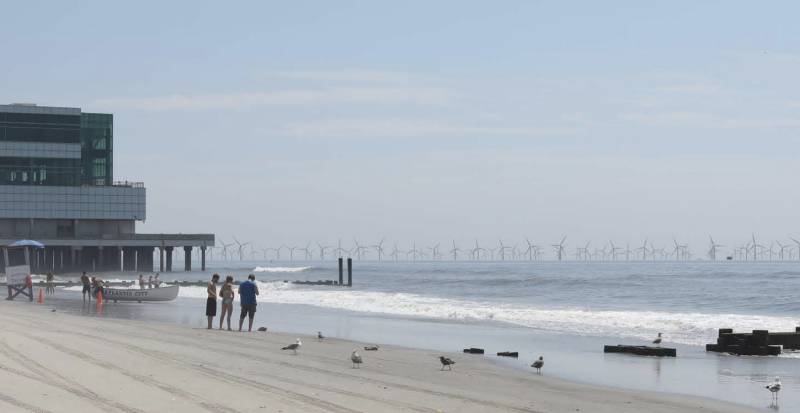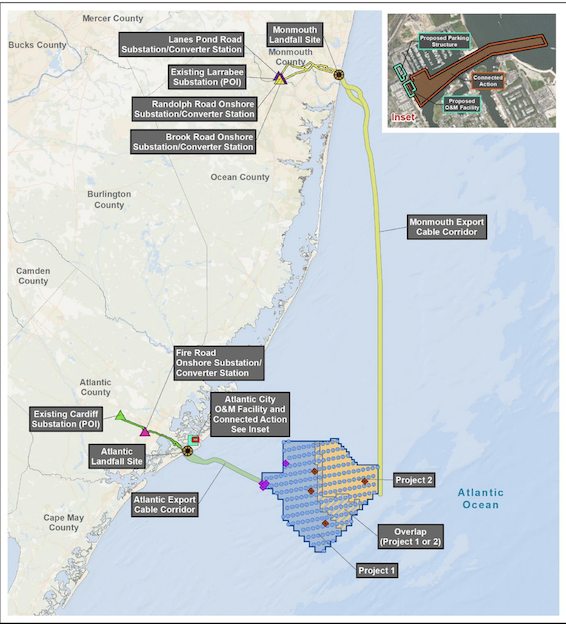Local groups opposing New Jersey offshore wind projects hoped this week’s public meetings on the Atlantic Shores development would be a platform for voicing their strenuous objections.
But the federal Bureau of Ocean Energy Management held the first session Wednesday evening in a highway Holiday Inn hotel in Manahawkin, N.J., in the style of an informal informational session, rather than a formal public hearing on its draft environmental impact statement (DEIS) on Atlantic Shores.
Dozens of visitors, many of them seaside residents from nearby Long Beach Island, made a circuit of poster presentations. Presentations on how turbines will be visible from the beach – and the project’s impact on marine mammals – attracted the most attention.
Some visitors went toe-to-toe debating with BOEM staffers and agency contractors about the DEIS findings. Others, who had hoped for publicly making their cases before an audience, were dismissive of the proceedings.
“Typically BOEM. Totally tone-deaf,” said Greg DiDomenico, a fisheries management specialist with Lund’s Fisheries in Cape May, N.J.
“It’s supposed to be all about dialogue,” said Cynthia Zipf, executive director of the Clean Ocean Action environmental group, which has been critical of BOEM’s planning for large wind energy developments in the New York Bight.
On arrival visitors were directed to a reception desk where they could sign up to present formal comments on the DEIS.
“The goal of these meetings is to help attendees provide written comments for the record,” according to email notifications from BOEM. “Comments can be provided by meeting with a court reporter at the meeting, by submitting comments to www.regulations.gov or by sending written comments to BOEM.”
BOEM released the draft environmental impact statement May 15 and is taking public comments for 45 days ending July 3. Four public meetings – the Wednesday session in Manahawkin, another Thursday at the Atlantic City Convention Center and online sessions June 26 and June 28 – will inform the final EIS, the agency says.
The two-phase project could build around 200 wind turbines off Long Beach Island, Brigantine an Atlantic City, an array with a nameplate capacity for generating up to 2,800 megawatts. It’s a 50/50 joint venture between Shell New Energies US LLC and EDF-RE Offshore Development, LLC, a subsidiary of EDF Renewables North America.
Export cables carrying energy from the project would come ashore at landfall sites in Atlantic City, and another about 60 miles north in Monmouth County.
Passions have run high among anti- and pro-wind power groups, since whale strandings on New Jersey beaches last winter that project opponents tied to survey work on project sites.
The BOEM event at the Holiday Inn in Manahawkin was patrolled by private security guards from a local firm, 609 Security. When a reporter walked in with a 35 mm still camera, a BOEM staffer told him that Holiday Inn management would not allow cameras inside.
According to as BOEM spokesperson, the agency “was not aware of the hotel management policy about no cameras being allowed inside the meeting until just before the event. BOEM welcomes media coverage on the Atlantic Shores South public meetings.”
In the state’s beach resort towns, homeowners and tourism businesses are worried over how the visual effect of Atlantic Shores and other turbine arrays may affect their customers’ affection for traditional beach vacation spots. The DEIS documents discuss the appearance of machines that would reach 1,065 feet high from the sea surface to tips of the rotor blades.
In the DEIS, simulated digital visualizations by Atlantic Shore and BOEM show how those views may look from various vantage points, under conditions ranging from bluebird-clear days of 20-mile visibility to nighttime.

New Jersey surf clam fishermen have warned for years that they cannot operate in turbine arrays planned by Atlantic Shores and other developers unless the towers are spaced 2 nautical miles apart – about twice what wind companies and BOEM plan for.
Peter Himchak, a marine biologist who works with clam company LaMonica Fine Foods in Cape May, said he came to the meeting expecting to make another appeal.
The draft BOEM environmental statement rejects the 2 nm spacing alternative, and in remarks he prepared Himchak said the effect will be dire in the birthplace of the U.S. surf clam industry.
“Our worst fears have been realized and these dreaded exclusion areas will become the norm in the future for the clam industry and other commercial fisheries wherever wind turbines are constructed,” he wrote.
Himchak, who worked for decades in the New Jersey Division of Marine Fisheries, said he’s going to put it all on the record during BOEM’s virtual online sessions. Compared to the open-house events, they may be closer to a traditional public hearing format.
Following a second public session in Atlantic City Thursday, those online sessions will be held next week. Here’s how to register for the virtual public meetings.
Mon., June 26, 2023, 1 p.m.
Zoom Registration Link: https://us02web.zoom.us/webinar/register/WN_qWVcG76ARImltIUnePRJlQ
Dial-in phone number (Toll Free): 888-788-0099
Meeting ID: 832 2926 2927
Password: 21932097
Wed., June 28, 2023, 5 p.m.
Zoom Registration Link: https://us02web.zoom.us/webinar/register/WN_2Wp7wze4TeqaOT2g6xsEeA
Dial-in phone number (Toll Free): 888-788-0099
Meeting ID: 881 4396 0125
Password: 90014716
Visit BOEM’s webpage for more information: https://www.boem.gov/renewable-energy/state-activities/atlantic-shores-south.







